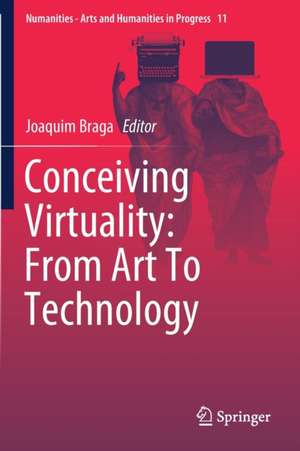Conceiving Virtuality: From Art To Technology: Numanities - Arts and Humanities in Progress, cartea 11
Editat de Joaquim Bragaen Limba Engleză Paperback – 19 sep 2020
This book provides new theoretical approaches to the subject of virtuality. All chapters reflect the importance of extending the analysis of the concept of “the virtual” to areas of knowledge that, until today, have not been fully included in its philosophical foundations. The respective chapters share new insights on art, media, psychic systems and technology, while also presenting new ways of articulating the concept of the virtual with regard to the main premises of Western thought.
Given its thematic scope, this book is intended not only for a philosophical audience, but also for all scientists who have turned to the humanities in search of answers to their questions.
| Toate formatele și edițiile | Preț | Express |
|---|---|---|
| Paperback (1) | 636.80 lei 6-8 săpt. | |
| Springer International Publishing – 19 sep 2020 | 636.80 lei 6-8 săpt. | |
| Hardback (1) | 643.00 lei 6-8 săpt. | |
| Springer International Publishing – 19 sep 2019 | 643.00 lei 6-8 săpt. |
Din seria Numanities - Arts and Humanities in Progress
- 18%
 Preț: 729.53 lei
Preț: 729.53 lei - 18%
 Preț: 941.82 lei
Preț: 941.82 lei - 24%
 Preț: 580.92 lei
Preț: 580.92 lei - 15%
 Preț: 651.84 lei
Preț: 651.84 lei - 15%
 Preț: 640.55 lei
Preț: 640.55 lei -
 Preț: 414.66 lei
Preț: 414.66 lei -
 Preț: 393.90 lei
Preț: 393.90 lei -
 Preț: 378.12 lei
Preț: 378.12 lei - 20%
 Preț: 559.86 lei
Preț: 559.86 lei -
 Preț: 381.81 lei
Preț: 381.81 lei -
 Preț: 388.72 lei
Preț: 388.72 lei - 18%
 Preț: 733.15 lei
Preț: 733.15 lei - 15%
 Preț: 639.90 lei
Preț: 639.90 lei - 18%
 Preț: 725.13 lei
Preț: 725.13 lei - 18%
 Preț: 785.24 lei
Preț: 785.24 lei - 18%
 Preț: 724.94 lei
Preț: 724.94 lei - 15%
 Preț: 696.68 lei
Preț: 696.68 lei - 15%
 Preț: 638.57 lei
Preț: 638.57 lei - 15%
 Preț: 647.27 lei
Preț: 647.27 lei - 24%
 Preț: 679.08 lei
Preț: 679.08 lei -
 Preț: 420.20 lei
Preț: 420.20 lei - 18%
 Preț: 727.48 lei
Preț: 727.48 lei - 15%
 Preț: 527.32 lei
Preț: 527.32 lei -
 Preț: 385.29 lei
Preț: 385.29 lei -
 Preț: 391.40 lei
Preț: 391.40 lei -
 Preț: 380.25 lei
Preț: 380.25 lei
Preț: 636.80 lei
Preț vechi: 749.19 lei
-15% Nou
Puncte Express: 955
Preț estimativ în valută:
121.85€ • 127.22$ • 100.85£
121.85€ • 127.22$ • 100.85£
Carte tipărită la comandă
Livrare economică 04-18 aprilie
Preluare comenzi: 021 569.72.76
Specificații
ISBN-13: 9783030247539
ISBN-10: 3030247538
Pagini: 210
Ilustrații: X, 210 p. 4 illus., 1 illus. in color.
Dimensiuni: 155 x 235 mm
Greutate: 0.32 kg
Ediția:1st ed. 2019
Editura: Springer International Publishing
Colecția Springer
Seria Numanities - Arts and Humanities in Progress
Locul publicării:Cham, Switzerland
ISBN-10: 3030247538
Pagini: 210
Ilustrații: X, 210 p. 4 illus., 1 illus. in color.
Dimensiuni: 155 x 235 mm
Greutate: 0.32 kg
Ediția:1st ed. 2019
Editura: Springer International Publishing
Colecția Springer
Seria Numanities - Arts and Humanities in Progress
Locul publicării:Cham, Switzerland
Cuprins
Chapter 1. Virtuality Beyond Reproduction Ontological Remarks.- Chapter 2. Phenomenology and the Challenge of Virtuality.- Chapter 3. Personality, Dissociation and Organic-Psychic Latency in Pierre Janet’s Account of Hysterical Symptoms.- Chapter 4. Sonic Virtuality, Environment, and Presence.- Chapter 5. Imagination and Virtuality On Susanne Langer’s Theory of Artistic Forms.- Chapter 6. The Virtual as Precondition for Artistic Creation.- Chapter 7. The Virtuality of Cinema: Beyond the Documentary-Fiction Divide with Peter Watkins and Mark Rappaport.- Chapter 8. Digital Fabrication and its Meanings for Photography and Film.- Chapter 9. The Reality of the Virtual in Deleuze’s Transcendental Empiricism.- Chapter 10. The Scope of the Virtual in the Treatment of Melancholia.- Chapter 11. The End of the Virtual? A Hermeneutical Approach to Digitality.- Chapter 12. Utopia, Ideology, and Philosophy.
Notă biografică
Joaquim Braga is FCT-Postdoctoral Research Fellow at the Department of Philosophy of University of Coimbra, and member of the Research Unit "Institute for Philosophical Studies". He is graduated in philosophy at the Faculty of Letters of the University of Coimbra. In 2010, he finished his PhD at Humboldt University of Berlin, with a thesis based on the philosophy of Ernst Cassirer. His current fields of research cover Picture Theory, Aesthetics, Philosophy of Culture and Modern Philosophy, with a special interest in symbolic thought. His works include, among others, Die symbolische Prägnanz des Bildes. Zu einer Kritik des Bildbegriffs nach der Philosophie Ernst Cassirers (Freiburg, 2012), Rethinking Culture and Cultural Analysis – Neudenken von Kultur und Kulturanalyse (with Christian Möckel, Berlin, 2013), Símbolo e Cultura (Coimbra, 2014), Bernard de Mandeville's Tropology of Paradoxes: Morals, Politics, Economics, and Therapy (with Edmundo Balsemão Pires, New York/London, 2015).
Textul de pe ultima copertă
This book provides new theoretical approaches to the subject of virtuality. All chapters reflect the importance of extending the analysis of the concept of “the virtual” to areas of knowledge that, until today, have not been fully included in its philosophical foundations. The respective chapters share new insights on art, media, psychic systems and technology, while also presenting new ways of articulating the concept of the virtual with regard to the main premises of Western thought.
Given its thematic scope, this book is intended not only for a philosophical audience, but also for all scientists who have turned to the humanities in search of answers to their questions.
Caracteristici
Provides a multidisciplinary study on the various extensions of the concept of “the virtual” Expands the thematic scope of virtuality Contributes to the theoretical redefinition of the concept of “the virtual”
